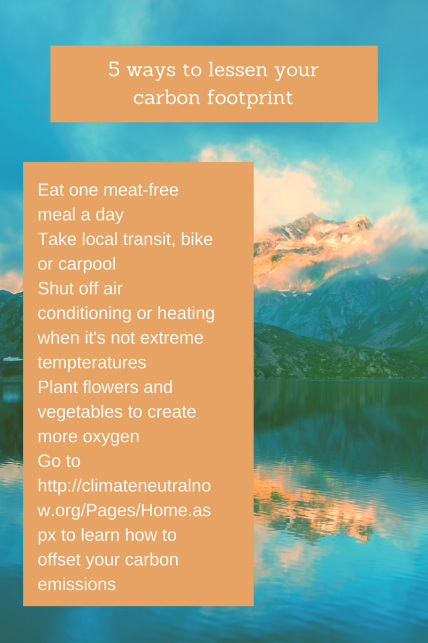April 22 is an ordinary day for many. Another day to focus on your daily routine. But April 22 is a day that allows us to make a concrete commitment to our world on Earth Day. 31 percent of Americans don’t even discuss climate change, a fact that shows how urgent it is to have better education, conversation and advocacy.
But how can we actually make an impact? And how can we make climate change matter right now to Americans? The first pillar of impact is educating yourself and individuals on this topic. By learning who climate change affects and how we are contributing to it, can help bridge the gap of misinformation from various individuals in the media and politics.

We constantly see in the news how climate change isn’t real or is made up by the Chinese. People will say it’s a hoax or just the natural changing of the Earth’s atmosphere. But this is misleading information. 97 percent of actively publishing climate scientists agree that climate change is due to human activity. Much of climate change comes from the greenhouse gasses we emit. By burning fossil fuels such as coal, oil and gas we are giving the Earth a carbon overload, suffocating our atmosphere with harmful gasses.
Another important educational tip on climate is that the Earth is warming at an alarming rate and causing massive problems across the globe already in 2017. If the Earth warms just 3.6 degrees thousands of animals will die, animals that provide sustenance for our ever-growing population. We will watch as coastal cities get crushed by mega storms and mass populations die from diseases that spread rapidly through a hotter planet.
Can we actually stop this from happening though? The good news is yes, we can. With our next pillar of impact; starting a conversation. Creating groups on campuses and throughout schools, in local communities and the workplace can help to mitigate some of the increasing problem with climate. By explaining the cause and effect of climate change and engaging in dialogue we can start the process of change. So here are some ways we can help decrease our carbon footprint from individuals to the country as a whole.
Some easy ways to limit our use personally is to be mindful of the energy we use everyday. Turn out the lights every time you leave a room, turn the water off when brushing your teeth, unplug your electronics from the wall when not in use and switch to green power through various energy companies by opting in for your electricity to come from wind or solar power.
We have a moral obligation to take care of our planet and its people. Already those in impoverished countries are dying because of what we do each day. These people contribute the least to climate change but are the most affected. Our carbon footprint encroaches on their health and safety all because we can’t make small changes as a country. If we use the cap and trade approach that was suggested during the 2015 Paris talks, we would greatly aid those in impoverished countries. By setting an amount of carbon for each country, we can set up a healthy trading system between the United States and countries that could use a boost to their economy. This can happen because when the United States needs more carbon allowances, they go to countries that haven’t used all their allowances and pay for it. It become a win-win for both countries because they increase capital and we get to continue using carbon which we so heavily rely on. Or we could use the plan recently proposed by distinguished and experienced Republicans that would put a real price on carbon use.
The last pillar of impact is advocacy. This might be the biggest level of impact yet. By developing a knowledge and passion for this social justice issue, we as citizens can make a global change. Start by emailing the representatives and senators for your district and state. They do actually read these emails and take your thoughts into consideration. One email won’t do the trick, but multiple, personal emails over time will help further the legislation needed to mitigate climate change. If you have an organization you are a part of rally them together for a trip to D.C. to lobby on the Hill. It is a thrilling, empowering and worthwhile experience to meet in person with your representative or senator and explain why progressive legislation is needed.
Earth Day might be another ordinary day for you. But Loquitur encourages every reader to view April 22 as a special commitment towards improving our planet, our health and our future. We only have one Earth that is sounding its alarm, asking for our help to keep it thriving. Small commitments we make today lead to big improvements over time. Answer the call.


